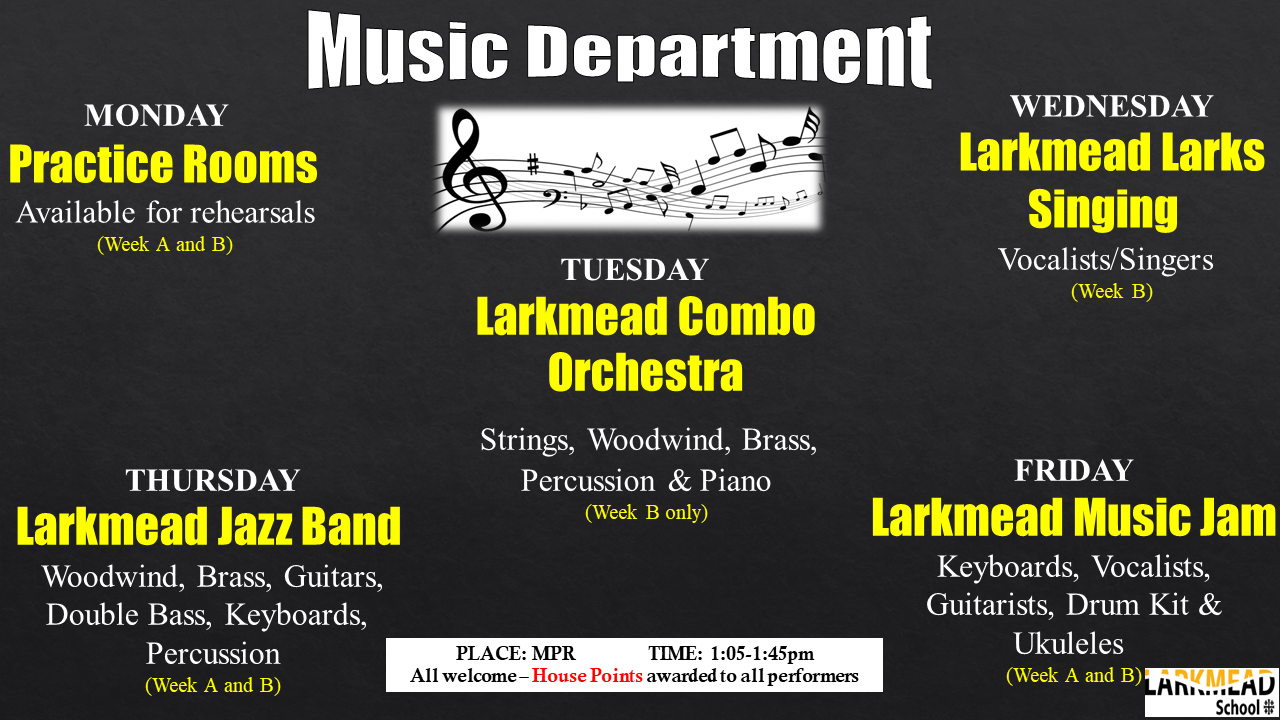Music
Head of Department : Ms McAuley - GMCAULEY@LARKMEAD.VALE-ACADEMY.ORG@larkmead.vale-academy.org
Key Stage 3
Music is a unique form of communication that can change the way pupils feel, think and act. Music forms part of an individual’s identity and positive interaction with music can develop pupils’ competence as learners and increase their self-esteem. Music brings together intellect and feeling and enables personal expression, reflection and emotional development. As an integral part of culture, past and present, music helps pupils understand themselves, relate to others and develop their cultural understanding, forging important links between home, school and the wider world.
Music education encourages active involvement in different forms of music-making, both individual and communal, helping to develop a sense of group identity and togetherness. Music can influence pupils’ development in and out of school by fostering personal development and maturity, creating a sense of achievement and self-worth, and increasing pupils’ ability to work with others in a group context.
Music learning develops pupils’ critical skills: their ability to listen, to appreciate a wide variety of music, and to make judgements about musical quality. It also increases self-discipline, creativity, aesthetic sensitivity and fulfilment.
Key Stage 4
There are 5 lessons per fortnight taught in a mixed ability group. Students will be taught composition, listening and performing through class activities in different styles including:
Shared Music – Solo and Accompaniment, Romantic song, Pop Ballad, the Classical concerto and Jazz Ensembles, Indian Classical Music, Gamelan Music, Baroque and Classical Chamber Music, The Great Choral Classics, African and Cappella Singing
Dance Music – Paired Dance: Waltz, Tango, Salsa. Synchronised Dance: American Line Dance, Irish Jig and Reel, Bhangra. Improvised Dance: Disco, Club Dance
Descriptive Music – Programme Music, Film Music
Students will learn by completing different tasks on their own, in groups and as a whole class including composing, listening and performing.
Key Stage 5
What will my child learn in A-Level Music
Music is an enjoyable and rewarding subject, although it is demanding because of the number of skills at which you need to be competent. You need to be able to perform at a minimum of Grade 4 standard on an instrument or singing, have an interest in music in all its diversity, and be prepared to take part in extracurricular activities.
The course includes performing (as a soloist and in an ensemble), composing in a variety of styles and techniques, the analysis of music and aural awareness.
The course is examined through course work (assessed both internally and externally), live performances and written papers.
Music lessons from Oxford County Music Service
We offer tuition in:
- strings: violin, viola, cello, double bass
- woodwind: flute, oboe, clarinet, bassoon, saxophone
- brass: trumpet, cornet, trombone, baritone, euphonium, horn (French and tenor), tuba
- percussion: drum kit, tuned percussion,
- guitar: classical, electric and bass
- keyboard
- vocal/singin
Learning an instrument | Oxfordshire County Council
|
|
Learning an instrument | Oxfordshire County Council
Key information. If only one pupil applies for a group lesson, they will stay on the waiting list until a group can be formed. Applicants can opt for an individual lesson.
|


